Advocating Cultural Competence in Mental Health Counselling Practices
VerifiedAdded on 2023/06/09
|6
|1277
|197
Essay
AI Summary
This essay delves into the critical role of cultural competence in clinical mental health counseling, emphasizing the importance of respecting diverse health practices, beliefs, and linguistic needs. It highlights the ethical obligation of mental health practitioners to prioritize cross-cultural skills and offer effective interventions to service users from various backgrounds, considering factors like ethnicity, race, culture, sexual orientation, socioeconomic status, gender, age, and religion. The essay discusses existing advocacy efforts, including guidelines for diverse populations, and identifies current advocacy needs, such as addressing attitudinal and structural barriers to improve mental health outcomes. Recommendations include designing inclusive services, providing in-depth training for counselors, promoting awareness of treatment disparities, and advocating for policy changes to support the cultural needs of diverse mentally ill clients. The conclusion underscores the significance of multicultural competencies in overcoming stigma and discrimination and ensuring that service users' preferences are considered in decision-making processes.
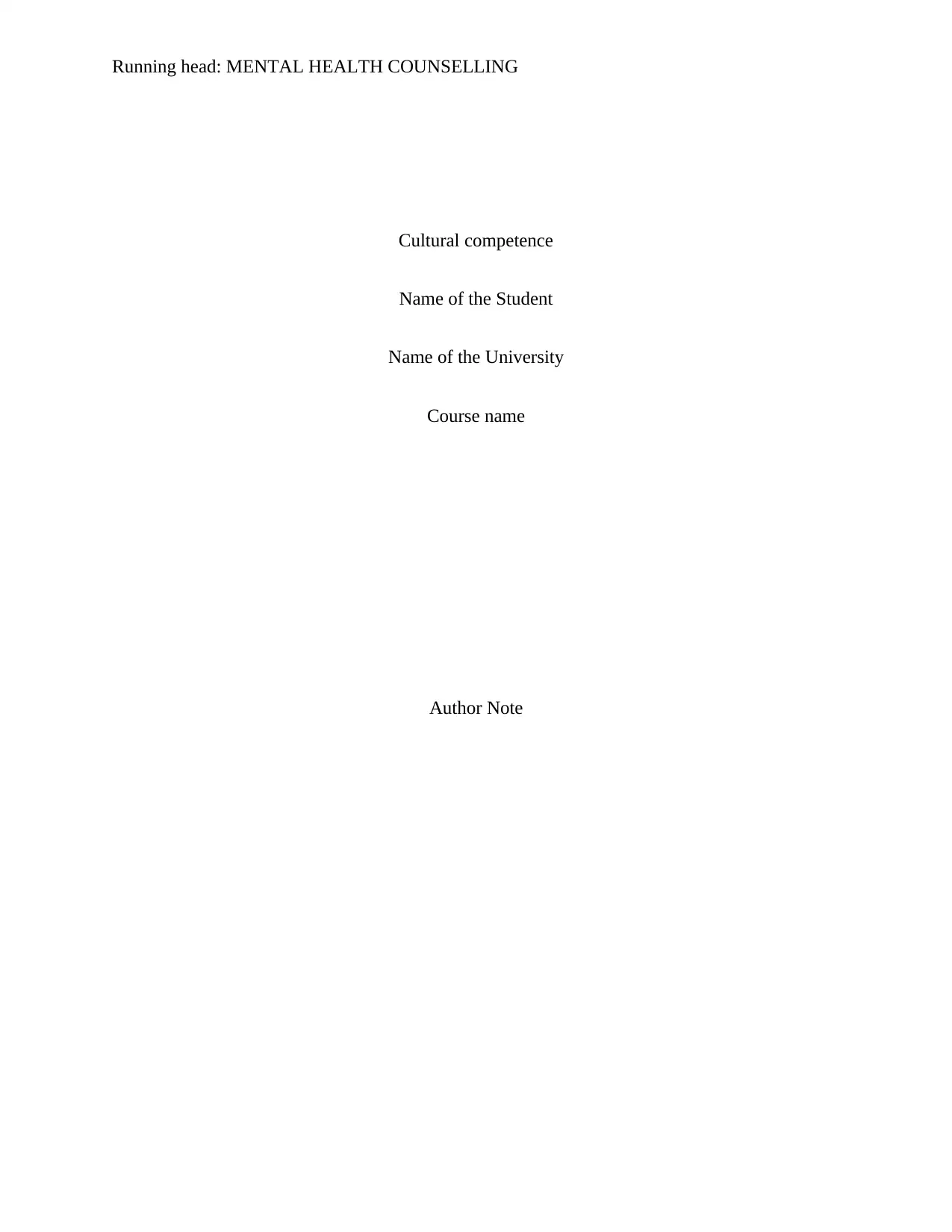
Running head: MENTAL HEALTH COUNSELLING
Cultural competence
Name of the Student
Name of the University
Course name
Author Note
Cultural competence
Name of the Student
Name of the University
Course name
Author Note
Paraphrase This Document
Need a fresh take? Get an instant paraphrase of this document with our AI Paraphraser
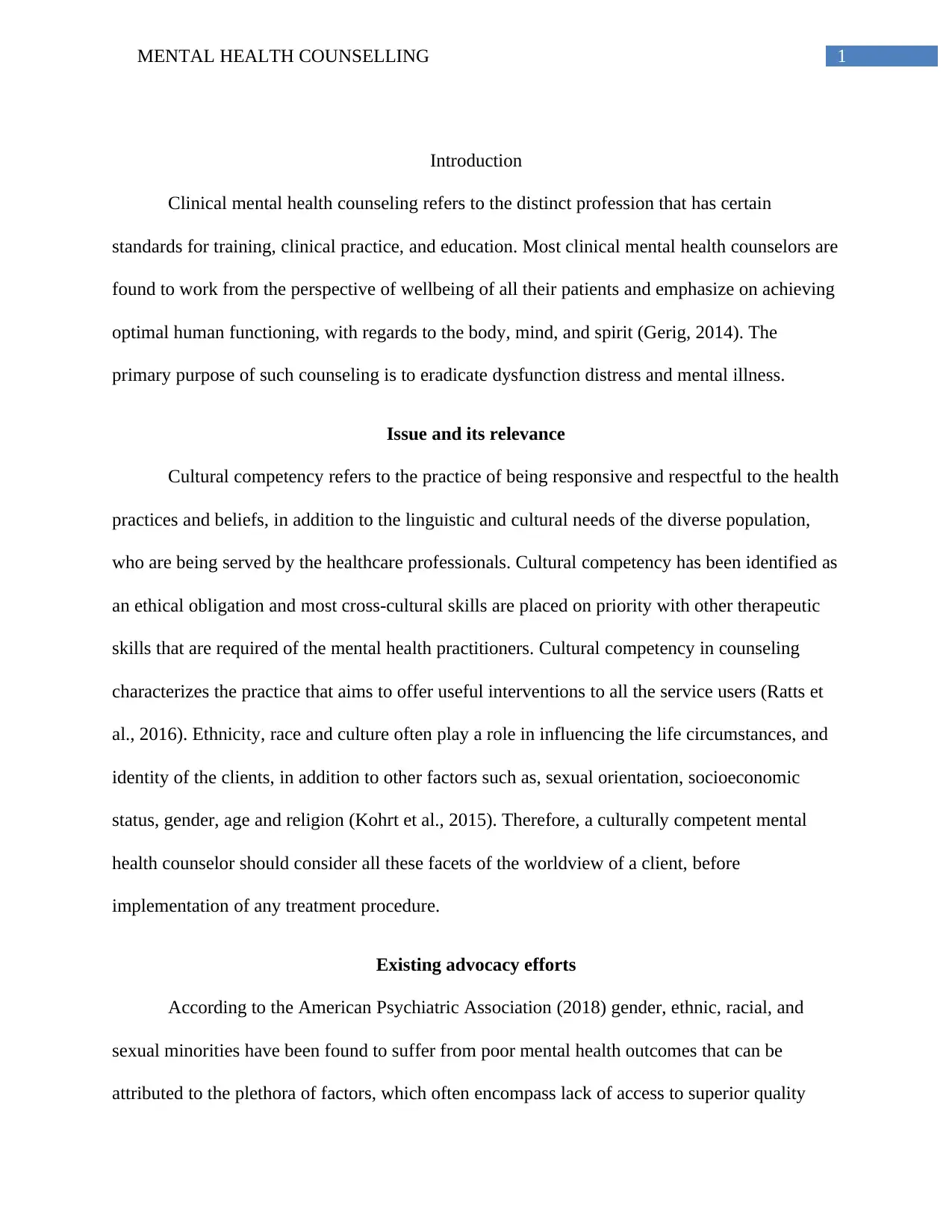
1MENTAL HEALTH COUNSELLING
Introduction
Clinical mental health counseling refers to the distinct profession that has certain
standards for training, clinical practice, and education. Most clinical mental health counselors are
found to work from the perspective of wellbeing of all their patients and emphasize on achieving
optimal human functioning, with regards to the body, mind, and spirit (Gerig, 2014). The
primary purpose of such counseling is to eradicate dysfunction distress and mental illness.
Issue and its relevance
Cultural competency refers to the practice of being responsive and respectful to the health
practices and beliefs, in addition to the linguistic and cultural needs of the diverse population,
who are being served by the healthcare professionals. Cultural competency has been identified as
an ethical obligation and most cross-cultural skills are placed on priority with other therapeutic
skills that are required of the mental health practitioners. Cultural competency in counseling
characterizes the practice that aims to offer useful interventions to all the service users (Ratts et
al., 2016). Ethnicity, race and culture often play a role in influencing the life circumstances, and
identity of the clients, in addition to other factors such as, sexual orientation, socioeconomic
status, gender, age and religion (Kohrt et al., 2015). Therefore, a culturally competent mental
health counselor should consider all these facets of the worldview of a client, before
implementation of any treatment procedure.
Existing advocacy efforts
According to the American Psychiatric Association (2018) gender, ethnic, racial, and
sexual minorities have been found to suffer from poor mental health outcomes that can be
attributed to the plethora of factors, which often encompass lack of access to superior quality
Introduction
Clinical mental health counseling refers to the distinct profession that has certain
standards for training, clinical practice, and education. Most clinical mental health counselors are
found to work from the perspective of wellbeing of all their patients and emphasize on achieving
optimal human functioning, with regards to the body, mind, and spirit (Gerig, 2014). The
primary purpose of such counseling is to eradicate dysfunction distress and mental illness.
Issue and its relevance
Cultural competency refers to the practice of being responsive and respectful to the health
practices and beliefs, in addition to the linguistic and cultural needs of the diverse population,
who are being served by the healthcare professionals. Cultural competency has been identified as
an ethical obligation and most cross-cultural skills are placed on priority with other therapeutic
skills that are required of the mental health practitioners. Cultural competency in counseling
characterizes the practice that aims to offer useful interventions to all the service users (Ratts et
al., 2016). Ethnicity, race and culture often play a role in influencing the life circumstances, and
identity of the clients, in addition to other factors such as, sexual orientation, socioeconomic
status, gender, age and religion (Kohrt et al., 2015). Therefore, a culturally competent mental
health counselor should consider all these facets of the worldview of a client, before
implementation of any treatment procedure.
Existing advocacy efforts
According to the American Psychiatric Association (2018) gender, ethnic, racial, and
sexual minorities have been found to suffer from poor mental health outcomes that can be
attributed to the plethora of factors, which often encompass lack of access to superior quality
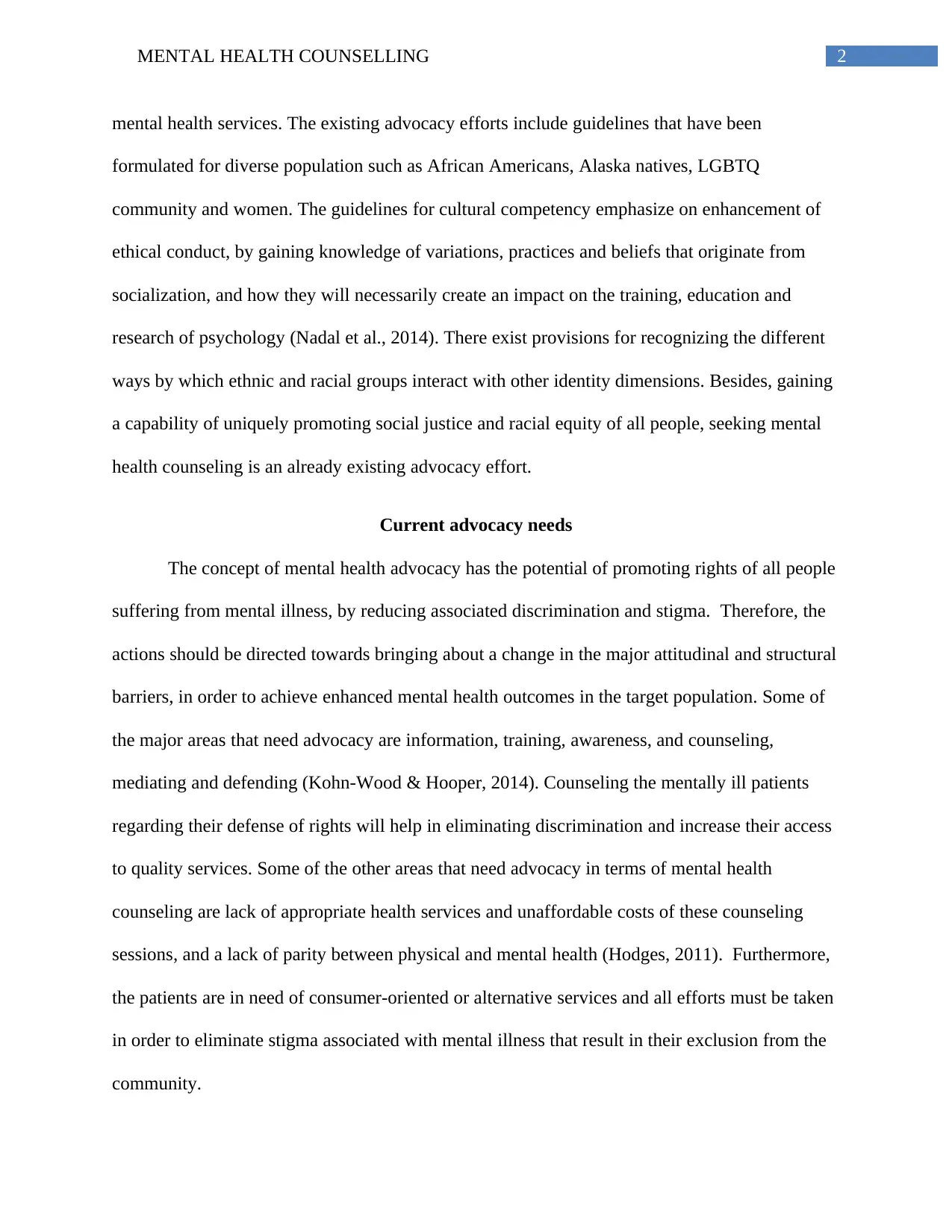
2MENTAL HEALTH COUNSELLING
mental health services. The existing advocacy efforts include guidelines that have been
formulated for diverse population such as African Americans, Alaska natives, LGBTQ
community and women. The guidelines for cultural competency emphasize on enhancement of
ethical conduct, by gaining knowledge of variations, practices and beliefs that originate from
socialization, and how they will necessarily create an impact on the training, education and
research of psychology (Nadal et al., 2014). There exist provisions for recognizing the different
ways by which ethnic and racial groups interact with other identity dimensions. Besides, gaining
a capability of uniquely promoting social justice and racial equity of all people, seeking mental
health counseling is an already existing advocacy effort.
Current advocacy needs
The concept of mental health advocacy has the potential of promoting rights of all people
suffering from mental illness, by reducing associated discrimination and stigma. Therefore, the
actions should be directed towards bringing about a change in the major attitudinal and structural
barriers, in order to achieve enhanced mental health outcomes in the target population. Some of
the major areas that need advocacy are information, training, awareness, and counseling,
mediating and defending (Kohn-Wood & Hooper, 2014). Counseling the mentally ill patients
regarding their defense of rights will help in eliminating discrimination and increase their access
to quality services. Some of the other areas that need advocacy in terms of mental health
counseling are lack of appropriate health services and unaffordable costs of these counseling
sessions, and a lack of parity between physical and mental health (Hodges, 2011). Furthermore,
the patients are in need of consumer-oriented or alternative services and all efforts must be taken
in order to eliminate stigma associated with mental illness that result in their exclusion from the
community.
mental health services. The existing advocacy efforts include guidelines that have been
formulated for diverse population such as African Americans, Alaska natives, LGBTQ
community and women. The guidelines for cultural competency emphasize on enhancement of
ethical conduct, by gaining knowledge of variations, practices and beliefs that originate from
socialization, and how they will necessarily create an impact on the training, education and
research of psychology (Nadal et al., 2014). There exist provisions for recognizing the different
ways by which ethnic and racial groups interact with other identity dimensions. Besides, gaining
a capability of uniquely promoting social justice and racial equity of all people, seeking mental
health counseling is an already existing advocacy effort.
Current advocacy needs
The concept of mental health advocacy has the potential of promoting rights of all people
suffering from mental illness, by reducing associated discrimination and stigma. Therefore, the
actions should be directed towards bringing about a change in the major attitudinal and structural
barriers, in order to achieve enhanced mental health outcomes in the target population. Some of
the major areas that need advocacy are information, training, awareness, and counseling,
mediating and defending (Kohn-Wood & Hooper, 2014). Counseling the mentally ill patients
regarding their defense of rights will help in eliminating discrimination and increase their access
to quality services. Some of the other areas that need advocacy in terms of mental health
counseling are lack of appropriate health services and unaffordable costs of these counseling
sessions, and a lack of parity between physical and mental health (Hodges, 2011). Furthermore,
the patients are in need of consumer-oriented or alternative services and all efforts must be taken
in order to eliminate stigma associated with mental illness that result in their exclusion from the
community.
⊘ This is a preview!⊘
Do you want full access?
Subscribe today to unlock all pages.

Trusted by 1+ million students worldwide
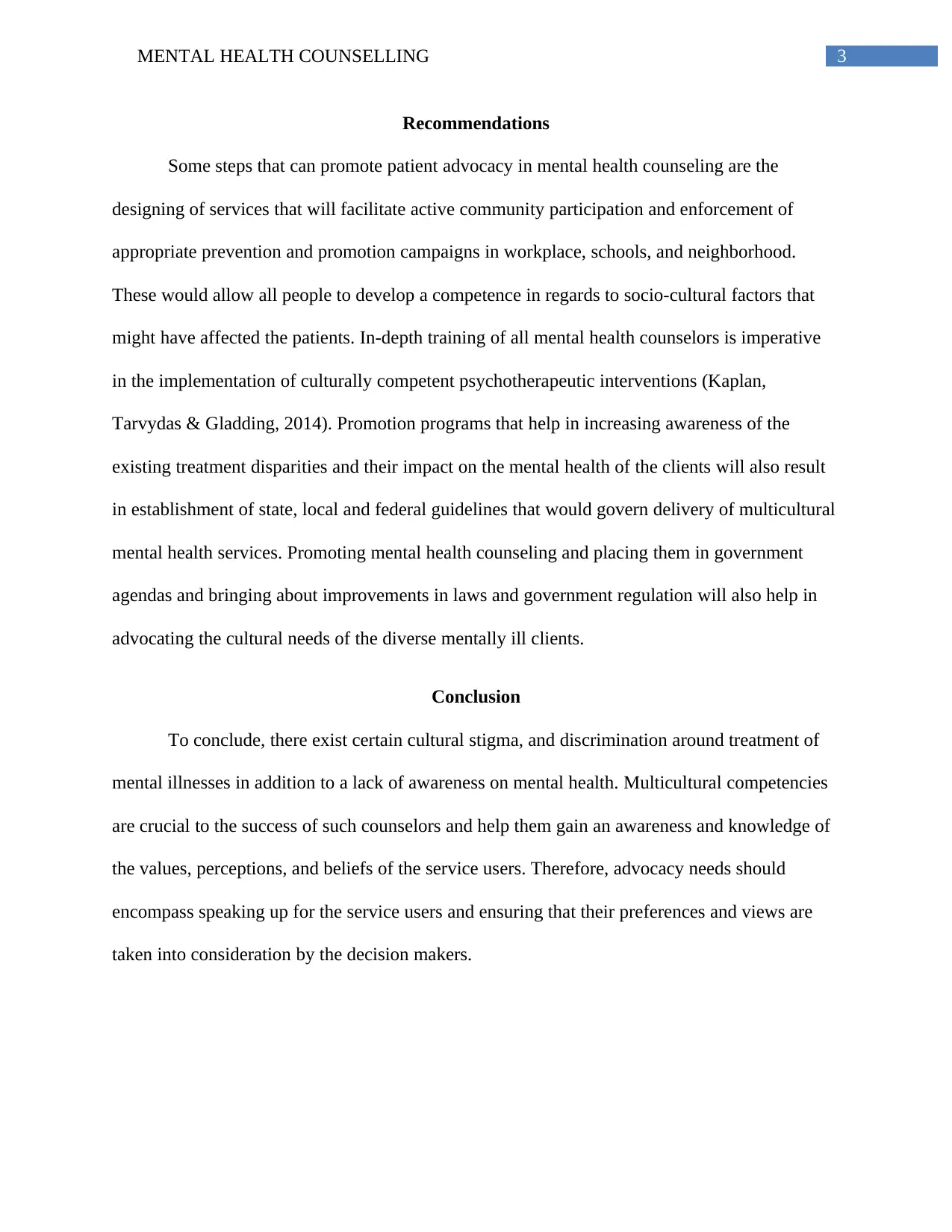
3MENTAL HEALTH COUNSELLING
Recommendations
Some steps that can promote patient advocacy in mental health counseling are the
designing of services that will facilitate active community participation and enforcement of
appropriate prevention and promotion campaigns in workplace, schools, and neighborhood.
These would allow all people to develop a competence in regards to socio-cultural factors that
might have affected the patients. In-depth training of all mental health counselors is imperative
in the implementation of culturally competent psychotherapeutic interventions (Kaplan,
Tarvydas & Gladding, 2014). Promotion programs that help in increasing awareness of the
existing treatment disparities and their impact on the mental health of the clients will also result
in establishment of state, local and federal guidelines that would govern delivery of multicultural
mental health services. Promoting mental health counseling and placing them in government
agendas and bringing about improvements in laws and government regulation will also help in
advocating the cultural needs of the diverse mentally ill clients.
Conclusion
To conclude, there exist certain cultural stigma, and discrimination around treatment of
mental illnesses in addition to a lack of awareness on mental health. Multicultural competencies
are crucial to the success of such counselors and help them gain an awareness and knowledge of
the values, perceptions, and beliefs of the service users. Therefore, advocacy needs should
encompass speaking up for the service users and ensuring that their preferences and views are
taken into consideration by the decision makers.
Recommendations
Some steps that can promote patient advocacy in mental health counseling are the
designing of services that will facilitate active community participation and enforcement of
appropriate prevention and promotion campaigns in workplace, schools, and neighborhood.
These would allow all people to develop a competence in regards to socio-cultural factors that
might have affected the patients. In-depth training of all mental health counselors is imperative
in the implementation of culturally competent psychotherapeutic interventions (Kaplan,
Tarvydas & Gladding, 2014). Promotion programs that help in increasing awareness of the
existing treatment disparities and their impact on the mental health of the clients will also result
in establishment of state, local and federal guidelines that would govern delivery of multicultural
mental health services. Promoting mental health counseling and placing them in government
agendas and bringing about improvements in laws and government regulation will also help in
advocating the cultural needs of the diverse mentally ill clients.
Conclusion
To conclude, there exist certain cultural stigma, and discrimination around treatment of
mental illnesses in addition to a lack of awareness on mental health. Multicultural competencies
are crucial to the success of such counselors and help them gain an awareness and knowledge of
the values, perceptions, and beliefs of the service users. Therefore, advocacy needs should
encompass speaking up for the service users and ensuring that their preferences and views are
taken into consideration by the decision makers.
Paraphrase This Document
Need a fresh take? Get an instant paraphrase of this document with our AI Paraphraser
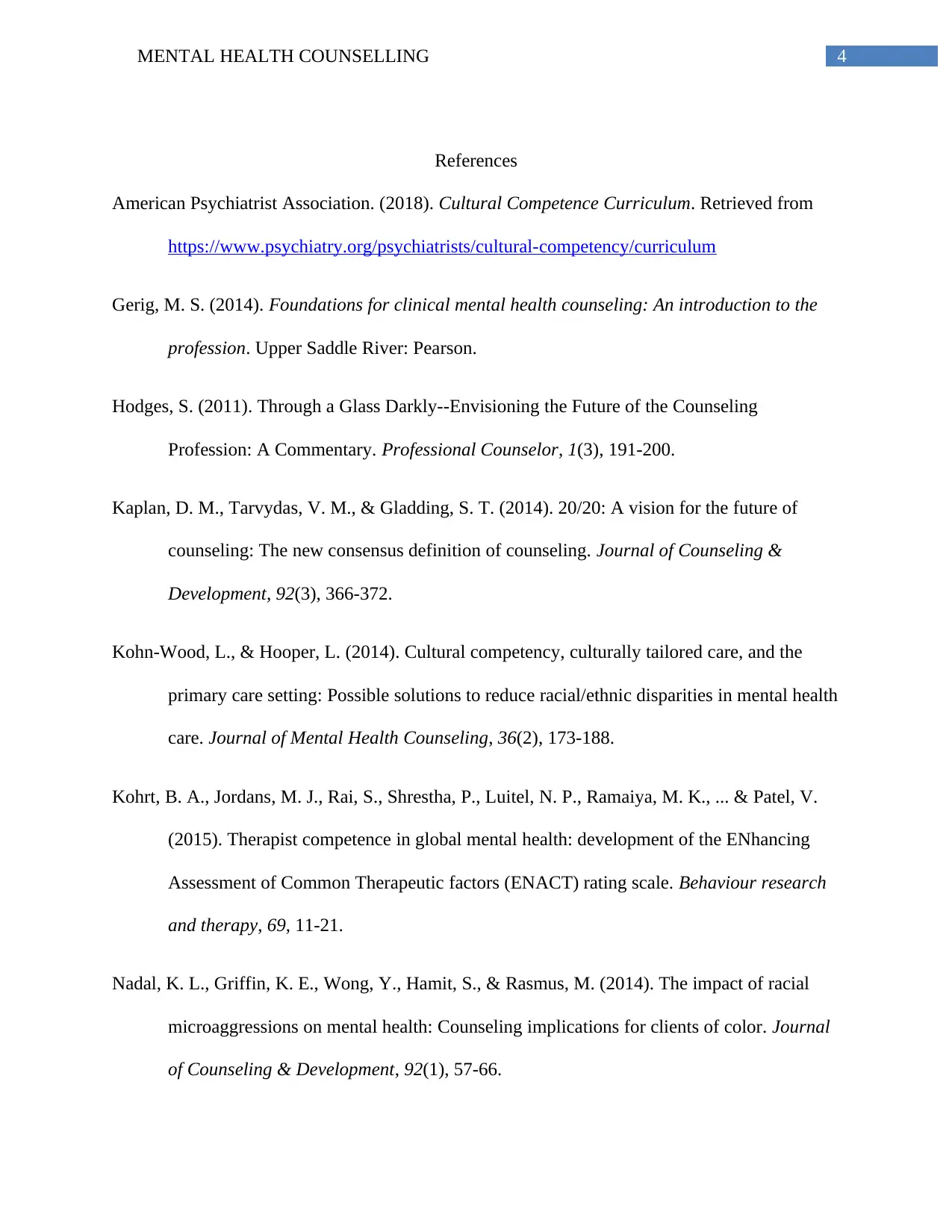
4MENTAL HEALTH COUNSELLING
References
American Psychiatrist Association. (2018). Cultural Competence Curriculum. Retrieved from
https://www.psychiatry.org/psychiatrists/cultural-competency/curriculum
Gerig, M. S. (2014). Foundations for clinical mental health counseling: An introduction to the
profession. Upper Saddle River: Pearson.
Hodges, S. (2011). Through a Glass Darkly--Envisioning the Future of the Counseling
Profession: A Commentary. Professional Counselor, 1(3), 191-200.
Kaplan, D. M., Tarvydas, V. M., & Gladding, S. T. (2014). 20/20: A vision for the future of
counseling: The new consensus definition of counseling. Journal of Counseling &
Development, 92(3), 366-372.
Kohn-Wood, L., & Hooper, L. (2014). Cultural competency, culturally tailored care, and the
primary care setting: Possible solutions to reduce racial/ethnic disparities in mental health
care. Journal of Mental Health Counseling, 36(2), 173-188.
Kohrt, B. A., Jordans, M. J., Rai, S., Shrestha, P., Luitel, N. P., Ramaiya, M. K., ... & Patel, V.
(2015). Therapist competence in global mental health: development of the ENhancing
Assessment of Common Therapeutic factors (ENACT) rating scale. Behaviour research
and therapy, 69, 11-21.
Nadal, K. L., Griffin, K. E., Wong, Y., Hamit, S., & Rasmus, M. (2014). The impact of racial
microaggressions on mental health: Counseling implications for clients of color. Journal
of Counseling & Development, 92(1), 57-66.
References
American Psychiatrist Association. (2018). Cultural Competence Curriculum. Retrieved from
https://www.psychiatry.org/psychiatrists/cultural-competency/curriculum
Gerig, M. S. (2014). Foundations for clinical mental health counseling: An introduction to the
profession. Upper Saddle River: Pearson.
Hodges, S. (2011). Through a Glass Darkly--Envisioning the Future of the Counseling
Profession: A Commentary. Professional Counselor, 1(3), 191-200.
Kaplan, D. M., Tarvydas, V. M., & Gladding, S. T. (2014). 20/20: A vision for the future of
counseling: The new consensus definition of counseling. Journal of Counseling &
Development, 92(3), 366-372.
Kohn-Wood, L., & Hooper, L. (2014). Cultural competency, culturally tailored care, and the
primary care setting: Possible solutions to reduce racial/ethnic disparities in mental health
care. Journal of Mental Health Counseling, 36(2), 173-188.
Kohrt, B. A., Jordans, M. J., Rai, S., Shrestha, P., Luitel, N. P., Ramaiya, M. K., ... & Patel, V.
(2015). Therapist competence in global mental health: development of the ENhancing
Assessment of Common Therapeutic factors (ENACT) rating scale. Behaviour research
and therapy, 69, 11-21.
Nadal, K. L., Griffin, K. E., Wong, Y., Hamit, S., & Rasmus, M. (2014). The impact of racial
microaggressions on mental health: Counseling implications for clients of color. Journal
of Counseling & Development, 92(1), 57-66.

5MENTAL HEALTH COUNSELLING
Ratts, M. J., Singh, A. A., Nassar‐McMillan, S., Butler, S. K., & McCullough, J. R. (2016).
Multicultural and social justice counseling competencies: Guidelines for the counseling
profession. Journal of Multicultural Counseling and Development, 44(1), 28-48.
Ratts, M. J., Singh, A. A., Nassar‐McMillan, S., Butler, S. K., & McCullough, J. R. (2016).
Multicultural and social justice counseling competencies: Guidelines for the counseling
profession. Journal of Multicultural Counseling and Development, 44(1), 28-48.
⊘ This is a preview!⊘
Do you want full access?
Subscribe today to unlock all pages.

Trusted by 1+ million students worldwide
1 out of 6
Related Documents
Your All-in-One AI-Powered Toolkit for Academic Success.
+13062052269
info@desklib.com
Available 24*7 on WhatsApp / Email
![[object Object]](/_next/static/media/star-bottom.7253800d.svg)
Unlock your academic potential
Copyright © 2020–2026 A2Z Services. All Rights Reserved. Developed and managed by ZUCOL.





